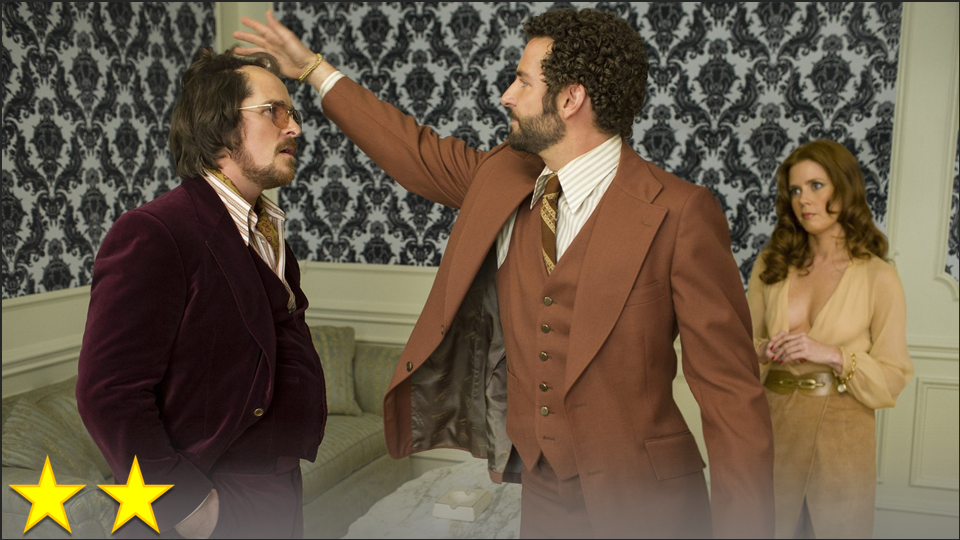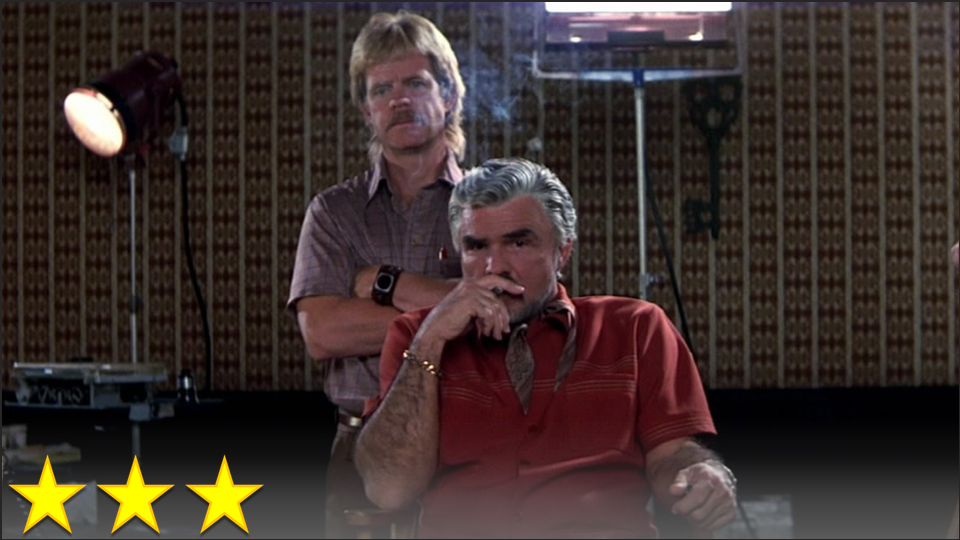I love my local library. Its one problem is that I like it too much, so whenever I go in for just a short stop, I end up spending at least half an hour there. Once I’m lost in the DVD section, there is only but one escape, and it is very rare: I have to find the movie that calls my name. I need to hear the triumphant sound of the movie that is exactly what I need to watch that night, and it can take ages to succeed at such a quest. One night, however, I found it – the movie that I had been longing to see for ages, and I could sense that it was finally time. American Hustle had Jeff Lynne’s music all over it, which already gives it a leg up in the race to my top 50 favorite movies. On top of that, the film stars actors that I like, and it’s written and directed by David O. Russell, whose film Silver Linings Playbook holds a very special place in my heart. However, I had just heard that his new release, Joy, is a disappointment, so I hoped and prayed that this movie would be reminiscent of the previous film and not the latter. Alas, it would seem God woke up on the wrong side of the bed that day, because American Hustle completely fell flat for me – and I’m starting to think I must not be in on the secret to enjoying it.
At this time of year, everyone’s talking about awards ceremonies that I don’t like. We’ve seen time after time that the elite overlords behind such ceremonies, particularly the Academy, tend to embarrass themselves by making obviously nonsensical decisions. The Oscars are being frowned upon right now for their lack of diversity among nominees, but they’ve been dropping the ball ever since they neglected to award Citizen Kane for Best Picture in favor of some flick called How Green Was My Valley. They were mocked in 1979 for giving Best Original Song to “It Goes Like It Goes” – a song that was considered forgettable even at the time, let alone decades in the future – instead of the more obvious choice: “The Rainbow Connection.” Don’t even get me started on The Lego Movie. With my disdain for such inane awards as the Oscars, the Golden Globes, and the Grammy Awards, I have been greatly pleased by an excellent joke of Conan O’Brien’s that’s been trending: “At last night’s Golden Globes, the movie ‘The Martian’ won for Best Comedy or Musical. In a related story, the Golden Globes won the prize for ‘Best Cop Drama or Best Latin Gospel Album.'” The nominations have really never made much sense, but the most mind-boggling of them all is the notion that American Hustle is a great comedy. I don’t see how it can be considered a great comedy when I honestly was unaware that it was a comedy until well after I’d finished watching it.
It’s no surprise that I had to look up the movie online to learn that it was a comedy (and learn why people found it enjoyable) if I consider the brutally realistic style. The comedy of the film fluctuates between muted colors of humor that offer no punches, or harshness that goes far over the top in all the wrong directions. I’ll address the hard-hitting humor first, and then I’ll spend a little longer on the weak humor. There is a scene between Bradlee Cooper and Not Funny Louis C- nope. I can’t finish typing it; it’s just too depressing to think of Louis C. K. as unfunny. In short, he savagely beats Louis over the head with a telephone, and the scene uses awkward editing in an attempt to make the unwarranted violent abuse comical. The problem, of course, is that it’s not over-the-top enough to be funny – there is no indication in the scene, to my memory at least, that this is not meant to be taken seriously. I was watching an ugly beating, so I felt bad for the victim – and empathetic investment is the enemy of comedy.
In my searches through the inter-webs for why people got a laugh out of this film, I found very, very few reasons given, even though its description on Rotten Tomatoes starts with the words “Riotously funny….” One of the few jokes cited as a source of enjoyability was Cooper’s silly haircut. Because this film is a period piece about the ’70s, a stupid haircut is merely an inevitable part of making the movie feel realistic, so I’ll need something better than that to come even close to a smile. As I thought back on it, I recalled another scene that was an attempt at humor. It’s pretty simple: Unattractive Jennifer La- no, I can’t bring myself to say that either, so let’s just say “the wife” swears in front of her little boy, and the little boy repeats the profanity in a way that’s accidentally quite offensive. Ladies and gentlemen, prepare to read the words that I, J. D. Hansel, never imagined would be written about an iconic Oscar winner, but here they are: Anchorman 2 did this joke better. That, my friends, is a travesty.
Let’s take another look at Jennifer Lawrence’s character. She reminds me of “the pen squeaker.” Yes, I’m talking about that guy in high school who had that pen which happened to make an annoying squeaking sound when it was twisted, and he would twist it frequently just to bug people. If the intent was to annoy the girls sitting directly in front of the squeaker, I really enjoyed watching the pen squeaker make them squirm and yell for no good reason, but if the intent was to annoy me, it was not enjoyable in the least. So I suspect that, if the audience understands that how much of an annoyance Lawrence is to everyone else is supposed to be funny , then the audience enjoys her, but personally, I felt like I was the victim of her excruciating irritability. While Lawrence did play the character perfectly, the character will always stand out to me as a horrible reminder of how annoying my little siblings are when they scream and fuss all day. I spent the last third of the film hoping that someone would just punch her out to end it all, but no such consolation was offered.
This is, in my view, one of the most overrated films of all time, right alongside Cabaret, but there are elements of it that I like. The soundtrack is, as I expected, quite excellent. Jeff Lynne’s contributions are naturally strong, but the other songs are really fun too. The actors are clearly giving these performances their all, and they succeed at making me believe in their characters. As far as cinematography goes, it would seem as through Russell found an Instagram filter for “Oscar bait” and used it for the entirety of the film, but within the constraints of the Oscar bait look, it is shot and edited well. The best part, however, is the ending. While I will not reveal all of the details, it’s nice to see that there was, in fact, an interesting and clever hustle being set up this whole time that makes the movie feel more purposeful.
However, for me it always boils down to the characters, the world, and the story. If those three elements work together just right, it’s a great movie; if one of those elements is off, particularly the first, then we have a problem. This movie did not work for me because the world felt too real for anything to pop, the story felt too unfocused and messy for it to hold my attention, and the characters made me want to run over the DVD with my car. In the few days since I watched it, I’ve already forgotten much of the story, and I really don’t know how matters of such little importance took up so much screen time. This movie is not so much about telling a good story as it is about showing off impressive directorial skills and a brilliant cast, making it such a narcissistic piece that I couldn’t help but roll my eyes even if they were sewn in place. I am not surprised if people who appreciate films very differently than I do find themselves enjoying American Hustle, but for a film of this nature, one can only look at what it offers to each individual, and for me, it didn’t offer nearly enough.





